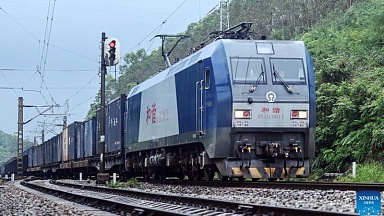The decision, announced on Friday, follows an almost-three-year investigation into allegations by a competitor that previous state support of DB Cargo had distorted the market.
The EC said it had concluded «that a German state aid measure of €1.9bn to support DB Cargo is in line with EU state aid rules».
The green light is contingent on implementation of a restructure that will divide DB Cargo into six separate business units, along with guarantees it will return to profitability and show long-term viability by 2026.
The commission added that its decision had been influenced by rail being «indispensable» to ensuring a lower-emissions alternative to road transport and a move to sustainable logistics.
However, it also confirmed, as had been expected, neither the German government nor DB Cargo’s state-backed parent company, DB Group, would be permitted to use a ‘profit-and-loss scheme’ to subsidise shortfalls resulting from rail freight operation losses.
This scheme had prompted the ire of DB Cargo’s competitors as years of cumulative losses reached billions of euros — last year alone, they reportedly exceeded €500m and, six months into this year, were at €261m. Although it has been suggested that a recent spike in sales could have begun reversing its fortunes.
A spokesperson for Die Gueterbahnen, which represents German private railroads, told The Loadstar DB Cargo had survived only through «below-cost prices», subsidised by state financing.
Die Gueterbahnen MD Peter Westenberger described the EC’s decision as a «good day for the future of rail freight», hoping it would put «an end to the unfair subsidisation of the company through taxpayers’ money».
Mr Westenberger told The Loadstar: «And it also puts an end to the possibility of damaging competitors and keeping them down with the help of dumping prices.
«The commission is also strengthening fair competition in the rail sector in Germany. If necessary, public funds may only be offered to all companies in the market on a non-discriminatory basis.»
And, he added, the approval of the €1.9bn was a «retroactive reinterpretation» of the loss compensation as a «permitted funding programme that never existed».
«A simple thought experiment shows how absurd this is: if the government was legitimately allowed to compensate rail freight losses from the past ten years, due environmental friendliness of rail freight transport, all affected companies should be able to submit applications,» he said.
DB Cargo employees may have less to celebrate, the restructuring is reportedly set to result in as many as 2,300 job losses.




